3 Effective Ways to Incentivize Mobile App Downloads
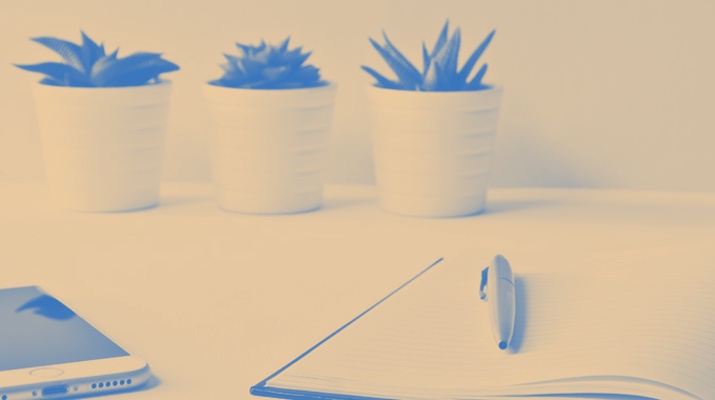
3 Effective Ways to Incentivize Mobile App Downloads
98% of companies incentivize app installs. Here are three examples of leading brands that use incentive tactics to drive downloads.
Consumers want apps that add value and convenience to their lives. The app store is busy, so a download incentive can speak loudly:
“Want more value? You can get it here.”
A recent survey by The Manifest found that most app owners offer a download incentive. This allows companies to showcase the benefits of their mobile product and distinguish themselves from competitors.
However, incentives are more than a short-term strategy. The best brands provide incentives that align with their audience’s persistent wants and motivations.
If done well, the carrot will lead users further into your larger mobile experience. An installation process that’s both rewarding and relevant will help you to achieve the greatest ROI and revenue from your app.
Here are three ways to incentivize mobile app downloads, using examples from leading brands:
- Discounted item or service
- Free item or service
- Accrued in-app rewards
1. Discounted Item or Service
Discounts are the most popular way to incentivize app installs. Of those surveyed by The Manifest, 71% of companies offer a discounted item or service for downloading their app. People love to save, so a welcome coupon can be an effective pull toward a download and beyond.
Seen below, the Macy’s app store listing features a 25% discount to first-time app users.
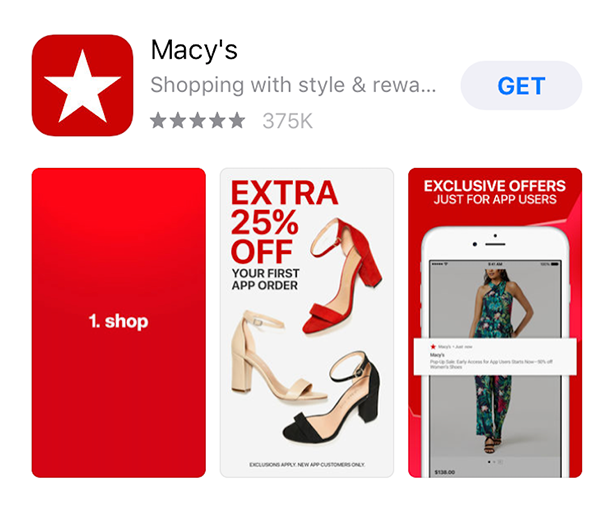
The apparel retailer succeeds by making the savings unmissable in a bold red. The discount is offset from the white background and the side panels offer supplemental benefits that enhance the app’s long-term appeal.
According to Hubspot, 86% of consumers download a shopping app at least once a month, and 64% download a shopping app to receive a discount on their first order. Consumers are always searching for new sources of value, so ensure that your discount will arrest users' attention and deliver enough value to be worth the effort.
“When trying to drive app downloads, entrepreneurs need to first identify their target audience and understand their values, pain, and motivations,” said Kate Abrosimov, co-founder of the digital consulting firm Kaiiax. “Then they need to create messages that can tap into customer motivations and put these messages where their audience spends most of their time.” Though 63% of apps are discovered through app store searches, traditional channels are key for finding new users.
Consider these strategies to increase app downloads:
- Email marketing that includes a discount only available through the app
- Social media content and promotions that showcase products and link to the app
- Search and display ads that connect users to your app rather than your site
2. Free Item or Service
Freebies motivate people to download your app who otherwise wouldn't. According to a recent survey, 65% of companies offer a free item or service for downloading their app.
The lure of a complimentary item is especially powerful if accompanied by an expiration date. “Limited-time incentives are an effective strategy to increase app downloads. It motivates consumers to take action now, rather than later,” said Shayla Price, formerly of the automation platform Kissmetrics.
For example, Chick-fil-A customers received a coupon for a free sandwich if they installed the app between June 1 - 11, 2017. Only redeemable until June 30, the coupon helped to attract new customers and to persuade existing users to engage with the updated app.
Seen below, the Chick-fil-A app promotion increased downloads by 14,285%, according to Survey Monkey Intelligence.
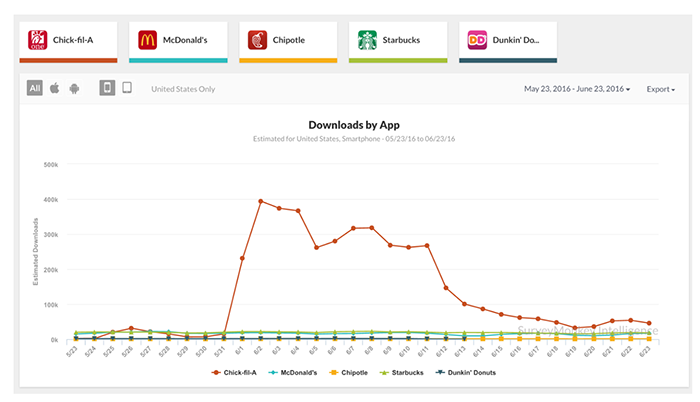
(Source)
Download volume surged due to word of mouth during the redemption period, as well as the unique way to install the app. Customers could tweet the hashtag #CFAOne and the brand’s cow emoji would appear. The user was then prompted to download the app from within Twitter.
Aimed at younger consumers, this tactic generated a significant buzz on social media during the app’s rollout. This novel installation process spiked social media engagement but also strengthened customer loyalties.
The downside to freebie incentives is that users often install and dump the app afterward. To avoid this, you can gate your offer behind a series of app engagements, such as a completed transaction or a set period of time. This way, users are exposed to the app’s value before redemption and potential abandonment.
3. Accrued In-App Rewards
Customers won’t mind if your incentives are confined to the app. According to The Manifest, 63% of companies offer accrued in-app rewards to entice a download, such as points or coins. Though generally less enticing than freebies or coupons, rewards can be more effective in promoting long-term app engagement.
But what if your mobile app is the platform for your customer loyalty program? In the case of Starbucks Rewards, customers will leap at the chance to enroll. Boasting a massive 48% user loyalty rate, Starbucks Rewards customers can redeem stars via their phone for free food and drinks in the store. This if-then relationship between in-app rewards and mobile engagement a brilliant way to drive both downloads and revenue.
Seen below, the app store title makes it clear that rewards are built into the app experience.
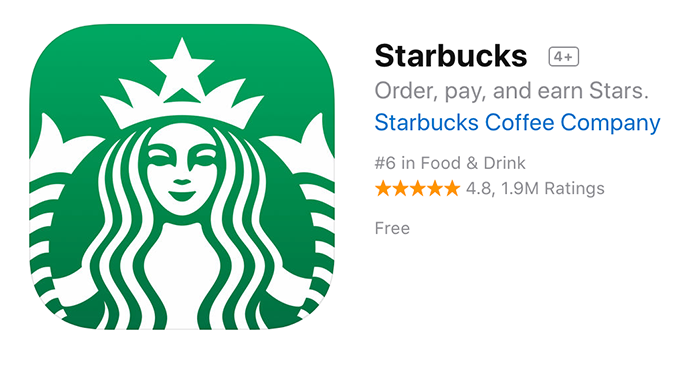
While rewards are desirable, the app itself is the main benefit to users – a “must have, must use” digital experience. Once the app is downloaded, the array of convenient features ensure that users become increasingly engaged and loyal. In fact, Starbucks Rewards members are currently responsible for 39% of the company's total sales, up 11% in Q2 of 2018.
Gamification – the adding of game elements to encourage engagement – helps to increase the app’s appeal. Earning stars is a way to earn status and recognition among loyalists and can later be traded in for free product. This extrinsic motivation helps the hesitant become steady users.
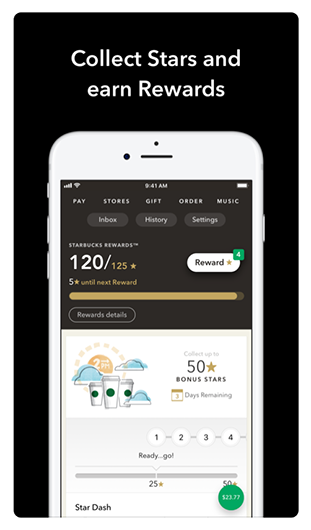
Accrued in-app rewards are most effective when customers know what’s being offered. If the rewards within your app aren’t obvious, you’ll need to generate awareness for them. Here are four ways to promote your in-app rewards, fresh from Starbucks:
- Add a footer to your marketing emails
- Promote in-app rewards on social media
- Feature your rewards on your website or a landing page
- Leverage your brick and mortar presence
Read "The Success of Starbucks App: A Case Study"
How to Incentivize Mobile App Downloads
For app marketers, to give is to receive. Make sure that your incentives are appropriate to your audience and enticing enough to drive action.
If your audience is aware of and attracted by the benefits you’ve offered, app downloads will increase.
